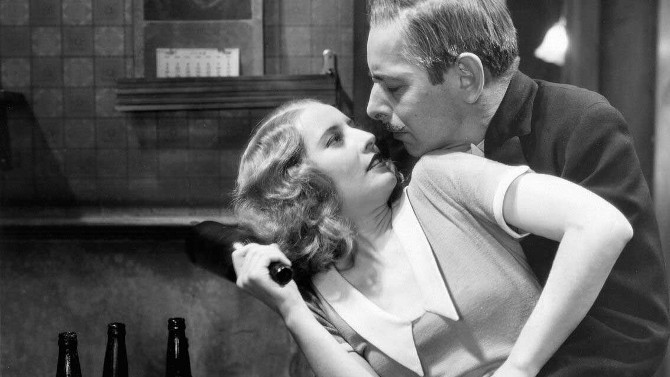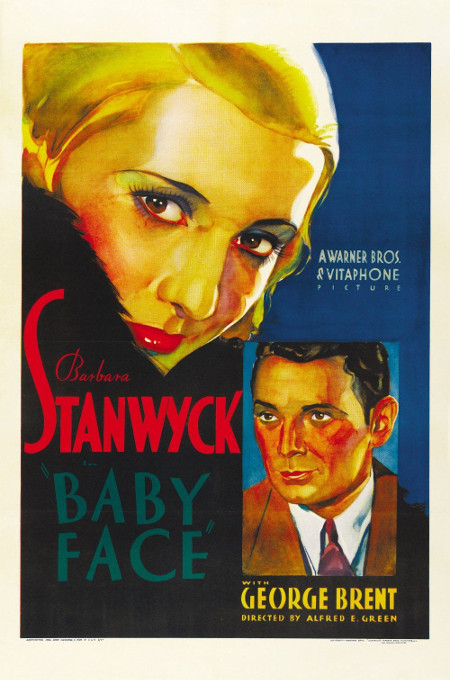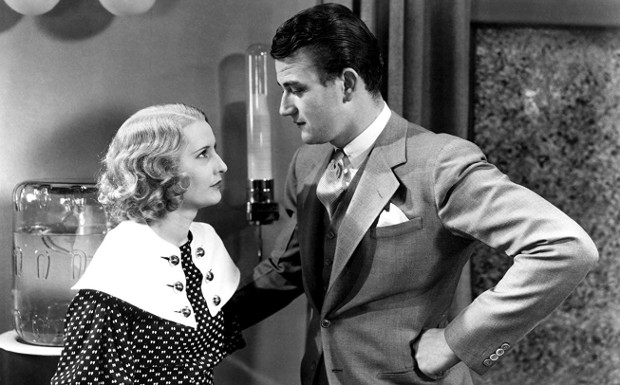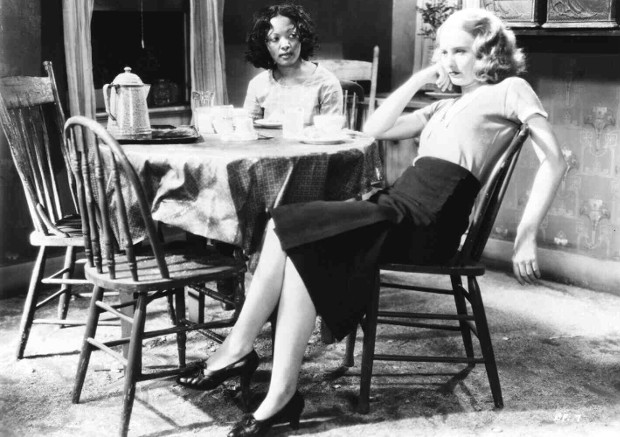“Face life as your find it––defiantly and unafraid. Waste no energy yearning for the moon. Crush out all sentiment.” Thoughts Out of Season, by Friedrich Nietzsche
Arguably one of the most scandalous narratives to come out of the pre-code era, Alfred E. Green’s notorious 1933 romantic drama Baby Face was one of the films that was so very controversial that it ended up giving the Motion Picture Production Code (Hays Code) its bite – the reigning moral guide for the next thirty plus years.
With a story from Darryl F. Zanuck (yes, the powerhouse studio head of 20th Century Fox – written under his pseudonym, Mark Canfield), the story follows Lily Powers (Barbara Stanwyck), aptly described by the bawdy tagline – “she had it and made it pay”.
The bartender for her father’s speakeasy, she has been pimped out since the age of fourteen. The only person to really care for her is not her dad, but rather an elderly patron of the establishment, Cragg (Alphonse Ethier), a Nietzsche fanatic who constantly implores her to break the chains that bind – to use her beauty as a power over men in order to become master rather than slave. . . exploitation in order to succeed.
After what can only be described as a tumultuous and disturbing day, Lily leaves her so-called home, making her way to New York City. . . conniving her way into a job at a banking institution that takes up an entire skyscraper. To put a slight spin on The Jeffersons’ theme song, Lily starts moving on up to that deluxe art deco penthouse in the sky.
But how is she to achieve such a difficult task – for many jobs stand between the bottom floor and that stunning residence that rests atop the building. Inspired by Nietzsche of course, she lies, cheats and sleeps her way up – twisting each man, be it a good guy, old guy, or wily guy, round her pinky finger, and, with the softest of tugs, can get them to do anything for her.
Making her way through low level employees, and middle men (a young John Wayne finds himself ensnared by the sultry dame), she finally places herself in a quality position, manipulating two influential men: an on the rise executive, Ned Stevens (Donald Cook) – who is engaged to the First Vice President’s daughter; and, you guessed it, the First VP, the much older and married J.P. Carter (Henry Kolker).
Of course, scandal eventually hits (perhaps not what you may be expecting), meaning that the board must bring in someone to give the institution a new image. . . they decide upon the sharp, cleverly coy grandson of the bank’s founder, Courtland Trenholm (George Brent) to take over the reins. With Lily’s name in all of the papers, and this new enigma running the company, he will be a tough nut to bust, I mean crack. Will Lily achieve her goal of reaching that elusive penthouse in the sky? If so, how many broken hearts, and homes, will she leave in her wake? Can there be a happy ending in such a sordid, debauched tale?
A fascinating, female driven story, we are truly fortunate to see the original uncut format. . . for even in 1933, it was chopped up, while other scenes were added to soften the vibe (even this version was often pulled from theatres early as the Production Code gained strength in its rigid moral cause). Thought to be forever lost, the original film was found in 2004, giving several more minutes of footage, as well as the original ending – more than two dozen differences in all. Most notably is a sequence in the speakeasy, when a corrupt politician pays for some time with Lily, his overt attempts leading him to fondle her breasts, causing her to hammer him over the head with a beer bottle (in the cut version, this scene is completely edited out). As for the original ending, it is less clear cut, while other moments find the sexual envelope being pushed (carnal favours being exchanged).
Littered with cheeky dialogue that often implies something more for those in the know, as an example, when Lily is asked, “When this thing happened, were you working very hard?”, she candidly replies, “Yeah, but not at the bank.” – so very telling indeed.
A movie that in many ways is still quite relevant, you’ll find seedy politicians, office affairs, embezzlement, and loose morals – its revealing story and frankly cynical language echoing many of the so-called problems found in society today. Intriguingly, like so many other pre-code features, its centerpiece is a female actress. . . perhaps this one is actually ahead of its time. There are so very many examples, such as Red-Headed Woman, which was led by Jean Harlow, Baby Face being Warner Bros.’ counterpunch to this MGM picture.
With a quality script (Zanuck sold his work to Warner Bros. for a dollar (as the studios were struggling during the Great Depression), a hot, sultry, horn-centric score (by W.C. Handy, Benny Davis, and Harry Akst) that speaks to the lead, and sharp performances, Baby Face is a supreme example of pre-code Hollywood and its controversially rivetting narratives. It must also be noted that Lily’s loyalty and friendship to her African American employee Chico (Theresa Harris) is unwavering, their bond something quite rare to see onscreen at that time. Though this may have been the end of these types of pre-code features, this is quite the last hurrah – so discover this jewel of a film and join the dramatic affair.




